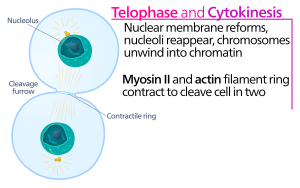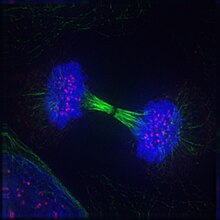Telophase

Telophase (from the Greek τέλος (télos), "end" and φάσις (phásis), "stage") is the final stage in both meiosis and mitosis in a eukaryotic cell.
During telophase, the effects of prophase and prometaphase (the nuclear membrane and nucleolus disintegrating) are reversed. Two daughter nuclei form in each daughter cell, and phosphatases de-phosphorylate the nuclear lamins at the ends of the cell, forming nuclear envelopes around each nucleus from components of the parent cell's nuclear envelope.[1][2] Two theories as to how this happens are:
- Vesicle fusion – When fragments of the nuclear membrane fuse to rebuild the nuclear membrane
- Reshaping of the endoplasmic reticulum – where the parts of the endoplasmic reticulum containing absorbed nuclear membrane envelop the nuclear space, reforming a closed membrane.[3]
The chromosomes reach the poles as the nuclear membranes re-form around each set of chromatids, the nucleoli also reappear. The remaining spindle microtubules begin to depolymerize. The chromosomes also unwind back into the expanded chromatin that is present during interphase. Telophase accounts for approximately 2% of the cell cycle's duration.

Cytokinesis typically begins before late telophase.[4]
In land plant cells, vesicles derived from the Golgi apparatus move to the middle of the cell along a microtubule scaffold called the phragmoplast. This structure directs packets of cell wall materials which coalesce into a disk-shaped structure called a cell plate. The cell plate grows out centrifugally and eventually develops into a proper cell wall, separating the two nuclei.
See also
References
- ^ Yael, Avisar; Choi, Jung; DeSaix, Jean; Jurukovski, Vladimir; Wise, Robert; Rye, Connie (2013). Biology. Rice University 6100 Main Street MS-375 Houston, Texas 77005: OpenStax College. p. 281-283. ISBN 978-1-938168-09-3.
- ^ Molecular Cell Biology. 4th edition. W H Freeman. 2000. pp. Section 13.4.
- ^ Hetzer, Mertin (March 2, 2012). "The Nuclear Envelope". Cold Spring Harbor Perspectives in Biology. 2 (3): a000539. doi:10.1101/cshperspect.a000539. PMC 2829960. PMID 20300205.
- ^ Reece, Jane; Urry, Lisa; Cain, Michael; Wasserman, Steven; Minorsky, Peter; Jackson, Robert (2011). Campbell Biology (10th ed.). Pearson. ISBN 978-0-321-77565-8.
External links
 Media related to Telophase at Wikimedia Commons
Media related to Telophase at Wikimedia Commons
